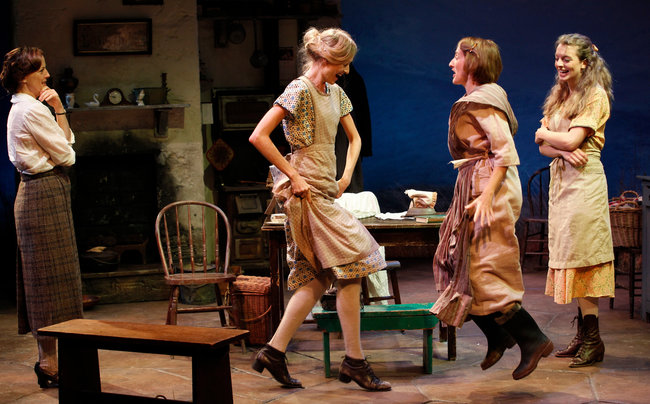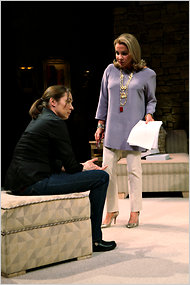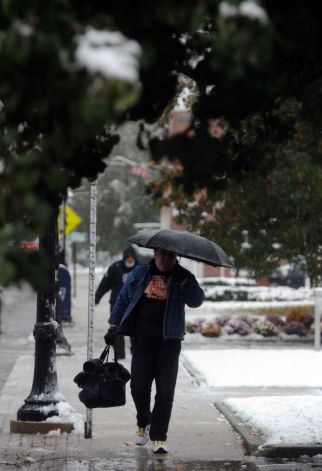V.S. Naipaul, The Mimic Men. Now that the uproar over Sir Vidia’s nastiness has started to subside, it’s worth recalling why we cared about him in the first place. Start with this bracingly astringent 1967 novel about a Caribbean politician whose uneasy embrace of Western manners and mores leaves him doubly estranged from the two worlds that he straddles. To my mind, it’s the best of Naipaul’s books–and the wisest (TT).
Archives for 2011
BOOK
Sabine Feisst, Schoenberg’s New World: The American Years (Oxford, $35). A satisfyingly thorough and probing study of Arnold Schoenberg’s life in America, to which he emigrated in 1933. Even if, like me, you don’t care much for his music, you’ll find it absorbing to read about how this most European of composers came to grips with the strange new world of southern California, which he liked far more than is generally realized. Though Feisst’s prose style is decidedly academic, Schoenberg’s New World tells a story so interesting that–for once–the quality of the writing doesn’t matter (TT).
CD
Pat Metheny, What’s It All About (Nonesuch). A lovely sequel to One Quiet Night, Metheny’s 2009 album of acoustic-guitar solos. This time around the fare consists of pop standards, some likely (“Alfie”), others joltingly unexpected (“Betcha by Golly, Wow”), and all played with luminescent sensitivity. Ideal for wee-small-hours listening (TT).
PLAY
Dancing at Lughnasa (Irish Repertory Theatre, 132 W. 22, extended through Jan. 29). Brian Friel’s 1990 masterpiece, a tragicomic memory play about the coming of modernity to Ireland, has been revived to piercingly enthralling effect by my favorite off-Broadway company. Absolutely not to be missed under any circumstances whatsoever (TT).
BOOK
Clark Terry, Clark: The Autobiography of Clark Terry (University of California, $34.95). A pungent, unusually plain-spoken memoir by the celebrated jazz trumpeter and educator. Though Terry, one of the few remaining musicians to have played with both Count Basie and Duke Ellington, is speaking through a ghostwriter (his second wife), Clark sounds like a real person swapping stories after hours, and the results are hugely readable (TT).
TT: The not-so-small world of Brian Friel
In today’s Wall Street Journal drama column I report enthusiastically on two New York openings, the Irish Repertory Theatre’s revival of Dancing at Lughnasa and the Broadway transfer of Lincoln Center Theater’s production of Other Desert Cities. Here’s an excerpt.
* * *
 In this country, Brian Friel’s name is known only to frequent playgoers, and those who don’t follow theater closely will likely be unaware that he is one of the world’s foremost living writers. Yet if I were to draw up a list of the half-dozen best English-language plays of the postwar era, one of them would definitely be by Mr. Friel, and that one would almost certainly be “Dancing at Lughnasa.” First performed in this country in 1991, “Dancing at Lughnasa” is a tragedy disguised as a comedy, a tender yet unsparingly truthful tale of how the coming of modernity wreaks havoc on a close-knit Irish family during two warm summer days in 1936. It is a timeless work of genius, unmistakably influenced by Chekhov (and also, I suspect, by “Our Town” and “The Glass Menagerie”) yet at least as good as anything the Russian master ever wrote, and the Irish Repertory Theatre has given it a revival that is worthy in every conceivable way.
In this country, Brian Friel’s name is known only to frequent playgoers, and those who don’t follow theater closely will likely be unaware that he is one of the world’s foremost living writers. Yet if I were to draw up a list of the half-dozen best English-language plays of the postwar era, one of them would definitely be by Mr. Friel, and that one would almost certainly be “Dancing at Lughnasa.” First performed in this country in 1991, “Dancing at Lughnasa” is a tragedy disguised as a comedy, a tender yet unsparingly truthful tale of how the coming of modernity wreaks havoc on a close-knit Irish family during two warm summer days in 1936. It is a timeless work of genius, unmistakably influenced by Chekhov (and also, I suspect, by “Our Town” and “The Glass Menagerie”) yet at least as good as anything the Russian master ever wrote, and the Irish Repertory Theatre has given it a revival that is worthy in every conceivable way.
Part of the beauty of “Dancing at Lughnasa” lies in the way in which Mr. Friel uses the smallest and most intensely local of cultures, that of rural Ireland, as a stage on which the wrenching story of worldwide change is played out. The Mundys would seem at first glance to be as far removed from contemporary Europe as it is possible to get. But just as their battery-powered radio brings them brief, ecstasy-making glimpses of the unknown world beyond their narrow borders, so does the coming of a footloose, ne’er-do-well Welshman (Kevin Collins) thrust them abruptly into the fast-flowing stream of 20th-century life. All at once Ballybeg, the tiny Irish village where most of Mr. Friel’s plays are set, is invaded by sex, war and ambition, the three horses of the modern apocalypse…
Charlotte Moore, the director, whose Irish Rep revival of Mr. Friel’s “Molly Sweeney” recently had an equally successful run at New Haven’s Long Wharf Theatre, has worked her usual miracle with the awkward yet oddly comfortable L-shaped space in which New York’s best off-Broadway company performs. The small world of Ballybeg fits neatly onto the Irish Rep’s teabag-sized stage, and Ms. Moore’s cast, well led by Orlagh Cassidy and featuring an especially striking performance by Aedín Moloney, is so evenly matched that you might almost think the actors were blood relatives….
 Jon Robin Baitz’s “Other Desert Cities,” which had a very successful run at Lincoln Center Theater last winter, has now transferred to Broadway, where it will surely do as least as well–and deservedly so. Though not without flaw, Mr. Baitz’s latest play, a group portrait of a Reaganesque show-business family whose members are keeping secrets from one another, is for the most part both soundly made and emotionally persuasive, and Stockard Channing, Rachel Griffiths, Stacy Keach, Judith Light and Thomas Sadoski are as good as a cast as anyone could hope for.
Jon Robin Baitz’s “Other Desert Cities,” which had a very successful run at Lincoln Center Theater last winter, has now transferred to Broadway, where it will surely do as least as well–and deservedly so. Though not without flaw, Mr. Baitz’s latest play, a group portrait of a Reaganesque show-business family whose members are keeping secrets from one another, is for the most part both soundly made and emotionally persuasive, and Stockard Channing, Rachel Griffiths, Stacy Keach, Judith Light and Thomas Sadoski are as good as a cast as anyone could hope for.
The high quality of “Other Desert Cities” may come as a surprise to those who saw Mr. Baitz’s “Chinese Friends,” a glib, hysterical dystopian fantasy about politics in postmodern America that couldn’t have been much dumber. “Other Desert Cities” is not without its own moments of slickness, both political (the Republicanism-as-pathology thread gets old fast) and theatrical (too much of the first act feels like one of Neil Simon’s joke-encrusted “serious” plays). But the second act, in which Mr. Baitz’s characters face up at last to the destructive consequences of their well-meant deceptions, packs a roundhouse punch…
* * *
Read the whole thing here.
TT: Almanac
“The possibility of venting or distilling friendly or unfriendly feelings through the medium of literary criticism is what makes that art such a skewy one.”
Vladimir Nabokov, interview with Alvin Toffler (Playboy, January 1964)
TT: Recent exasperations
 You probably read about the surprise winter storm that shut down much of Connecticut earlier this week. You may not know, however, that I got caught in it.
You probably read about the surprise winter storm that shut down much of Connecticut earlier this week. You may not know, however, that I got caught in it.
After seeing three shows in New York, I took the Sunday-morning train to Hartford to join Mrs. T, who had preceded me to our place in the woods near Storrs. The day after I arrived, the power went out–not just in Storrs but in the greater part of the state. Since we were taking care of our nephew, we couldn’t pull up stakes and return to New York, so we packed our bags and evacuated ourselves to my mother-in-law’s house in Southbury, one of the few places in Connecticut that had electricity, and spent two nights camping out in her guest room.
When it rains, hurricanes have been known to follow. I realized en route to Southbury that I was about to undergo a bout of what I euphemistically refer to as periodic plumbing problems. This happens to me every year or so, and it’s been known to happen at extremely unfavorable moments (i.e., during performances that I’m reviewing). All I could do was drink plenty of water and hope for the best, which occurred shortly before the power went back on in Storrs, to which we returned last night.
I’d been hoping to spend a few quiet days in the woods, emulating Jake Gittes and doing as little as possible. Needless to say, that didn’t happen, and now I’m headed back to New York, where I have three more shows to see, four more pieces to write, and a houseguest to amuse. If you’ve been wondering why I haven’t been posting or tweeting of late, that’s the reason: I wasn’t able to do much more in Southbury than check my e-mail twice a day.
 The good news–yes, there’s a bit of it–is that I read The Complete Fiction of Francis Wyndham during my unscheduled period of inactivity, and relished every page. (Go here to read more about this exceedingly curious character.) I also managed to write tomorrow’s Wall Street Journal drama column, which turned out better than I’d expected.
The good news–yes, there’s a bit of it–is that I read The Complete Fiction of Francis Wyndham during my unscheduled period of inactivity, and relished every page. (Go here to read more about this exceedingly curious character.) I also managed to write tomorrow’s Wall Street Journal drama column, which turned out better than I’d expected.
Otherwise, the week just past was a near-total loss, and I’m damned glad it’s over.
